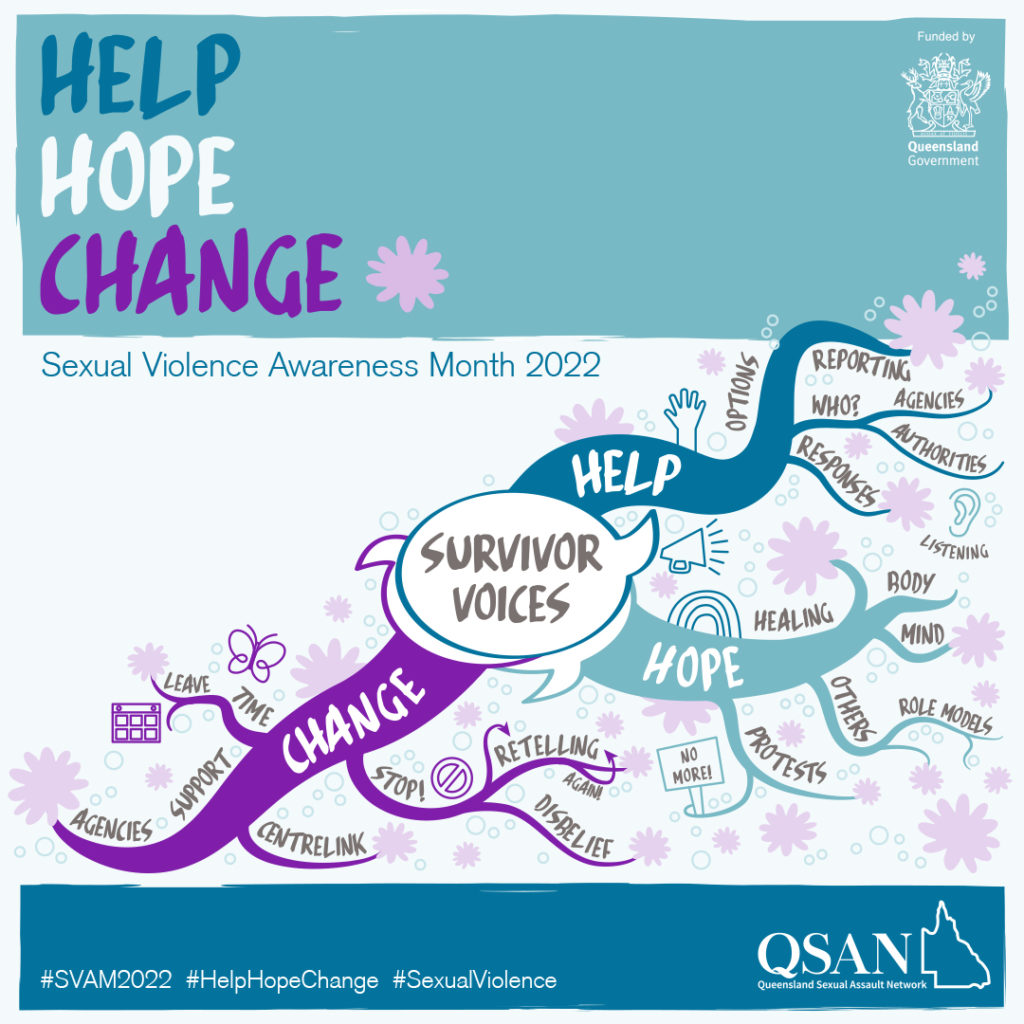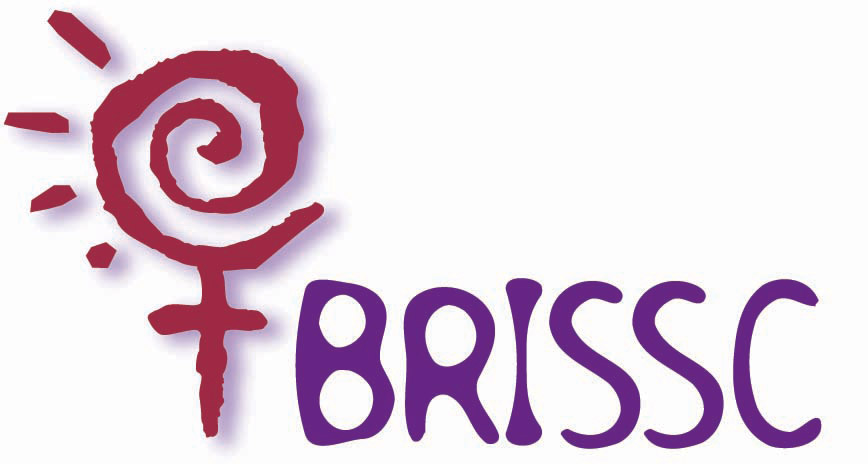#SVAM2022
October is Sexual Violence Awareness Month (SVAM). The theme for SVAM 2022 was Help, Hope, Change.
QSAN services (including BRISSC) held workshops across Queensland with victim-survivors in August 2022 and their responses to three questions would form the basis of a QSAN social media campaign for sexual violence awareness month.
What helped you through your experience of sexual violence?
The answers are a message to our community about what support victim-survivors need from our community and particularly when responding to disclosures about sexual violence.
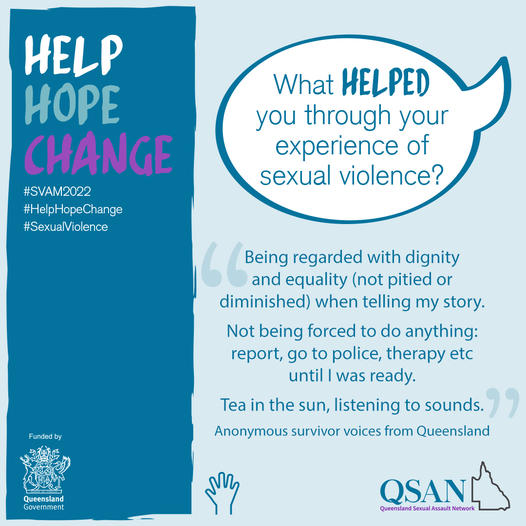
“Being regarded with dignity and equality (not pitied or diminished) when telling my story.”
“Not being forced to do anything: report, go to police, therapy etc until I was ready.”
“Tea in the sun, listening to sounds.”
“Having a creative outlet – gaming, plants, a self-care sensory box.”
“New clothes. Changing my environment, such as my bedroom.”
“Getting my driver’s licence.”
“Having control – powerful for healing.”
“Having an opportunity for social action, support groups, having a voice.”
Anonymous survivor voices from throughout Queensland
The answers are a message to our community about what support victim-survivors need from our community and particularly when responding to disclosures about sexual violence.
Many participants advised it was their pets, their children that got them through, but many spoke about the need for acceptance, consideration, attention, belief, awareness, time, space, and safety. For some obtaining accountability contributed to their healing.
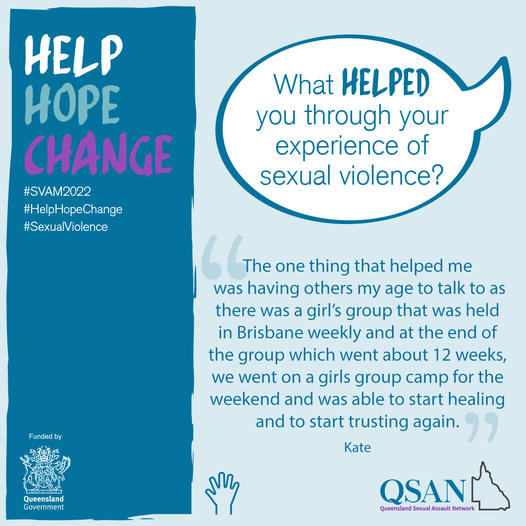
“The one thing that helped me was having others my age to talk to as there was a girl’s group that was held in Brisbane weekly and at the end of the group which went about 12 weeks, we went on a girls group camp for the weekend and was able to start healing and to start trusting again.”
Kate
Younger victim-survivors also participated in some of the workshops. This victim-survivor spoke of the importance of connecting with other young women to help her make sense of what happened to her.
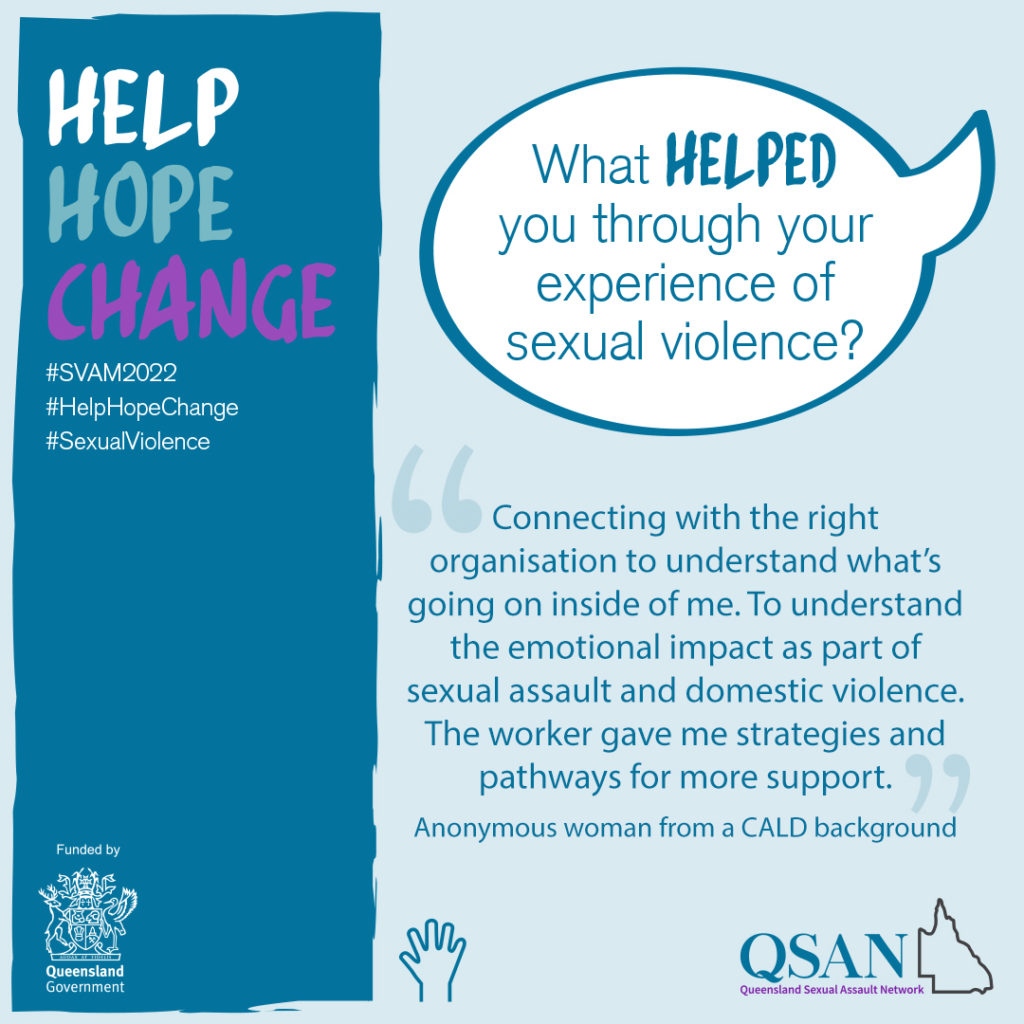
“Connecting with the right organisation to understand what’s going on inside of me. To understand the emotional impact as part of sexual assault and domestic violence. The worker gave me strategies and pathways for more support. Connected me with other right professionals to help make me understand my own strength and resilience. When you understand and know yourself it helps a lot. But healing may take many years because lot of mental, emotional pain due to violence.”
Anonymous woman from a CALD background.
Many victim-survivors advised that connecting with a specialist sexual violence service was a key to helping them make sense of what happened and normalising their reactions to the violence and abuse that had been perpetrated against them. Victim-survivors believed that these services should be free, be available more frequently than currently existed and should not have wait times.
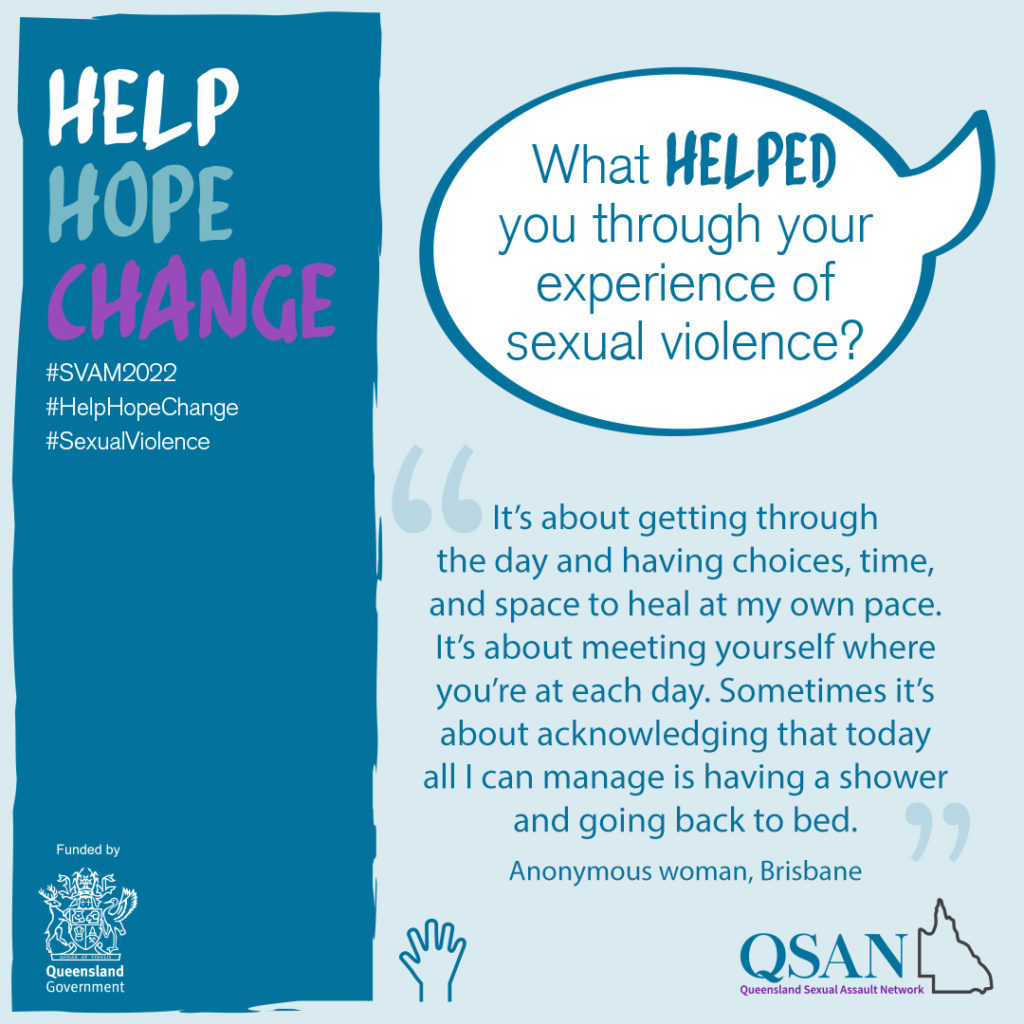
“It’s about getting through the day and having choices, time, and space to heal at my own pace. It’s about meeting yourself where you’re at each day. Sometimes it’s about acknowledging that today all I can manage is having a shower and going back to bed.”
Anonymous woman, Brisbane
Many respondents believed not putting pressure on themselves was important and taking one day at a time.
What is one thing that gives you hope?
A message of strength to other victim-survivors.
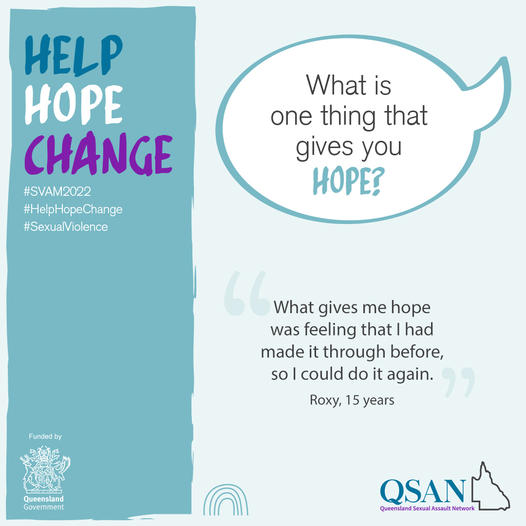
“What gives me hope was feeling that I had made it through before, so I could do it again.”
Roxy, 15 yo
The second question was “What is one thing that gives you hope?”, a message of strength to other victim-survivors.
The responses spoke of resilience and endurance, as well as recognition of the struggle of healing. When abuse has stopped, there is still aftermath; the impact it can have on body, mind, and identity. Revisiting memories can feel as real as the violence.
The personal accounts consistently evidenced the strong link between experiencing childhood sexual abuse and further experiences of violence throughout a person’s life. This cycle needs to be broken on a systemic and social level.
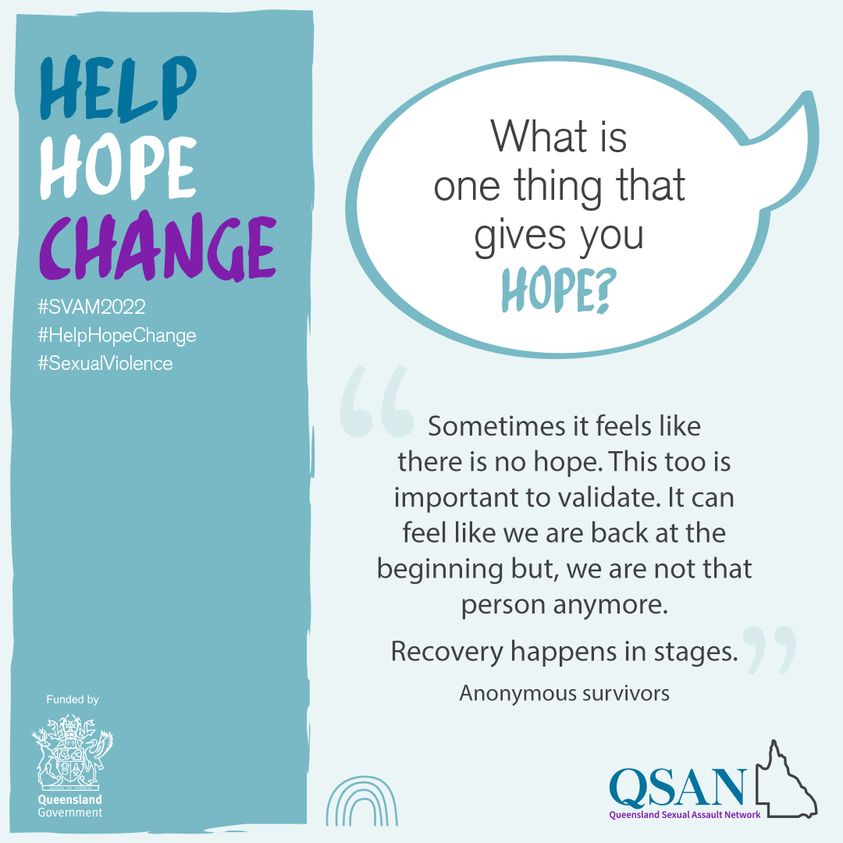
“Sometimes it feels like there is no hope. This too is important to validate. It can feel like we are back at the beginning but, we are not that person anymore.”
“Recovery happens in stages.”
Anonymous survivors
Many victim-survivors spoke of the difficulty of finding hope but persevering, nonetheless. Many participants spoke of knowing it takes time and work. So much of the burden should not have been on victim-survivors but, they persisted and found anchors. Healing is not linear, there isn’t a road map or a right or wrong way to work through an experience of sexual violence.
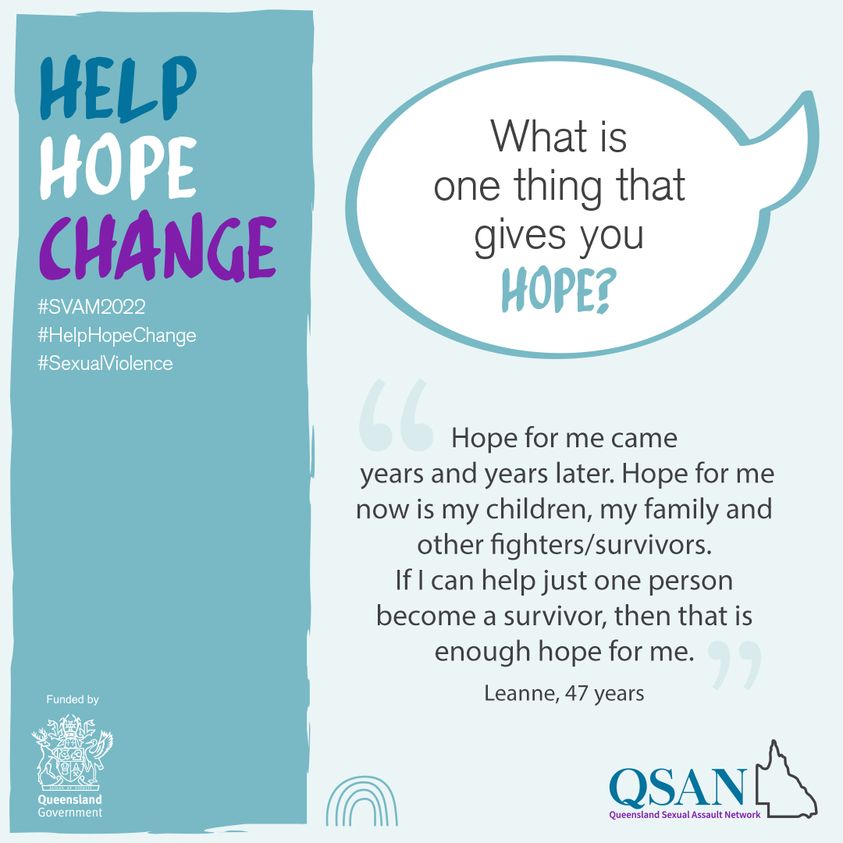
“Hope for me came years and years later. Hope for me now is my children, my family and other fighters/survivors. If I can help just one person become a survivor, then that is enough hope for me.”
Leanne, 47 years
Many spoke of the importance of discovering they are not alone. There were family (chosen, biological and animal), friends, faith/spirituality and services that made a difference along the way.
Some spoke of the significance of feeling free and safe from the violence. Hope was also seen through victim-survivor’s children and future generations – the life they get to live now.
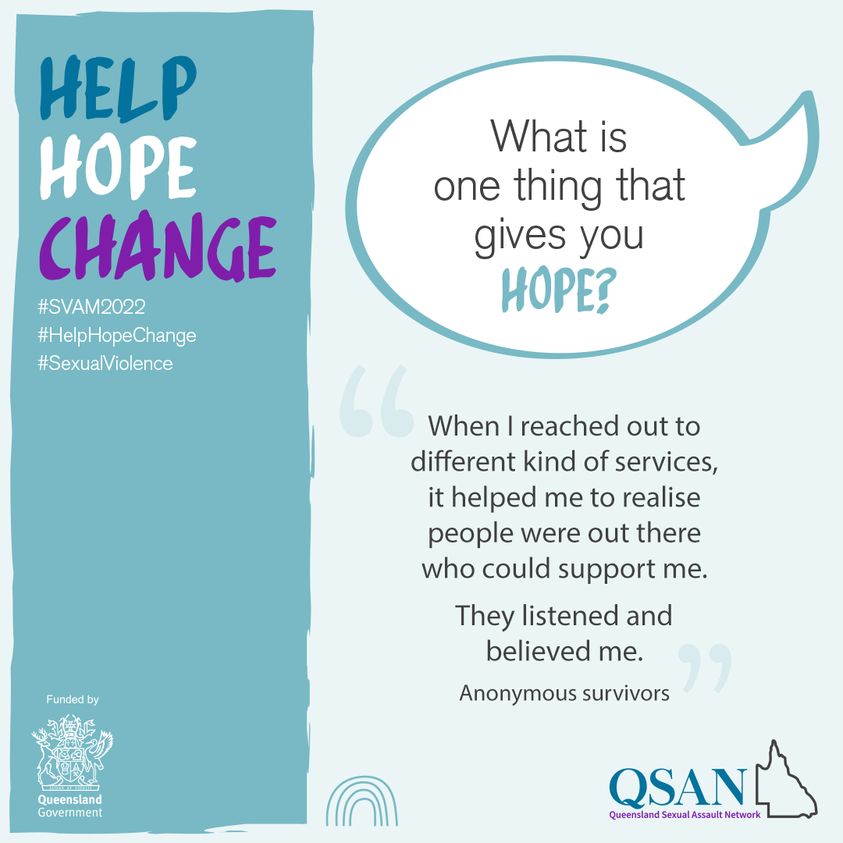
“When I reached out to different kind of services, it helped me to realise people were out there who could support me.”
“They listened and believed me.”
Anonymous survivors
Though under resourced, survivors spoke of the positive impact on their life of working with support services that listened and believed them without judgement. Services and counsellors that were able to offer pathways to explore. Others noted this support provided them opportunity to once again function and to rebuild their whole self.
What is one thing you would like to change?
This is a message to decision-makers and more broadly to our community.
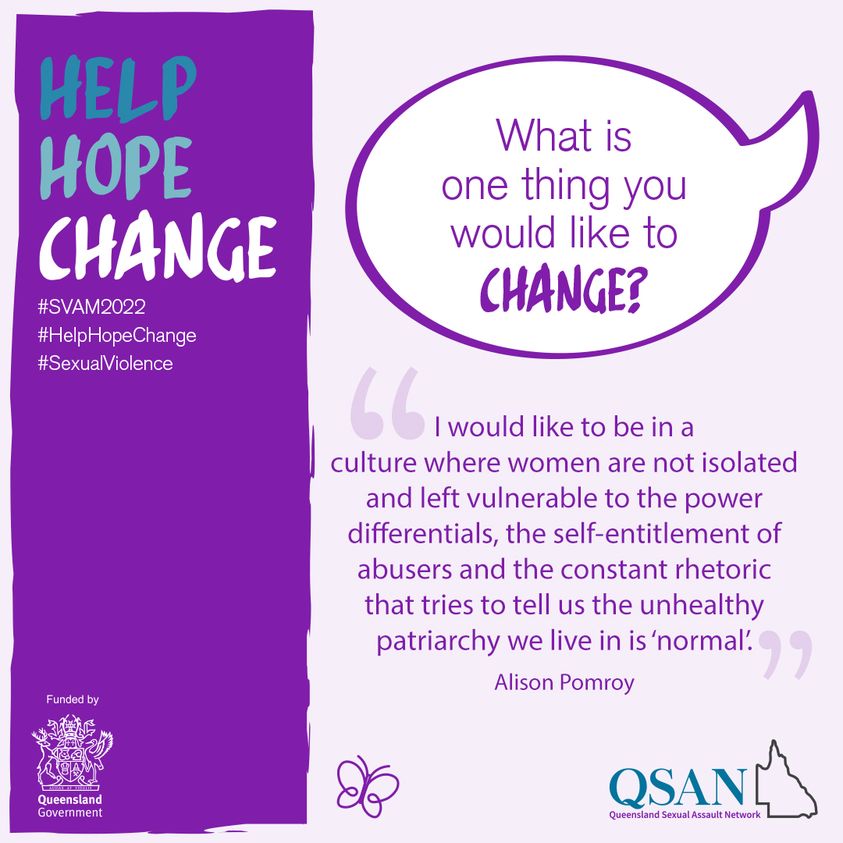
“I would like to be in a culture where women are not isolated and left vulnerable to the power differentials, the self-entitlement of abusers and the constant rhetoric that tries to tell us the unhealthy patriarchy we live in is ‘normal’.”
Alison Pomroy
“I would like to change community cultures so that people feel safe to share their story and receive support, and the community helps rather than perpetuates the problems.”
32-year-old, regular woman, Malanda.
“Parents need more support on how to help their children through sexual abuse.”
“Schools need to be more patient, and trauma informed.”
Child sexual abuse survivors
Victim-survivors, throughout their responses consistently identified the need for a change to systems for victim-survivor’s to be heard and to hear their experience without judgement. This was especially important for this message to be incorporated in responses by schools, health professionals, police, the legal system, and the community in general. The conversation about sexual abuse needs to ‘come out from the shadows’ and community attitudes and beliefs need to change. Victim-survivors understood the important need for advocacy to lead systemic and community change.
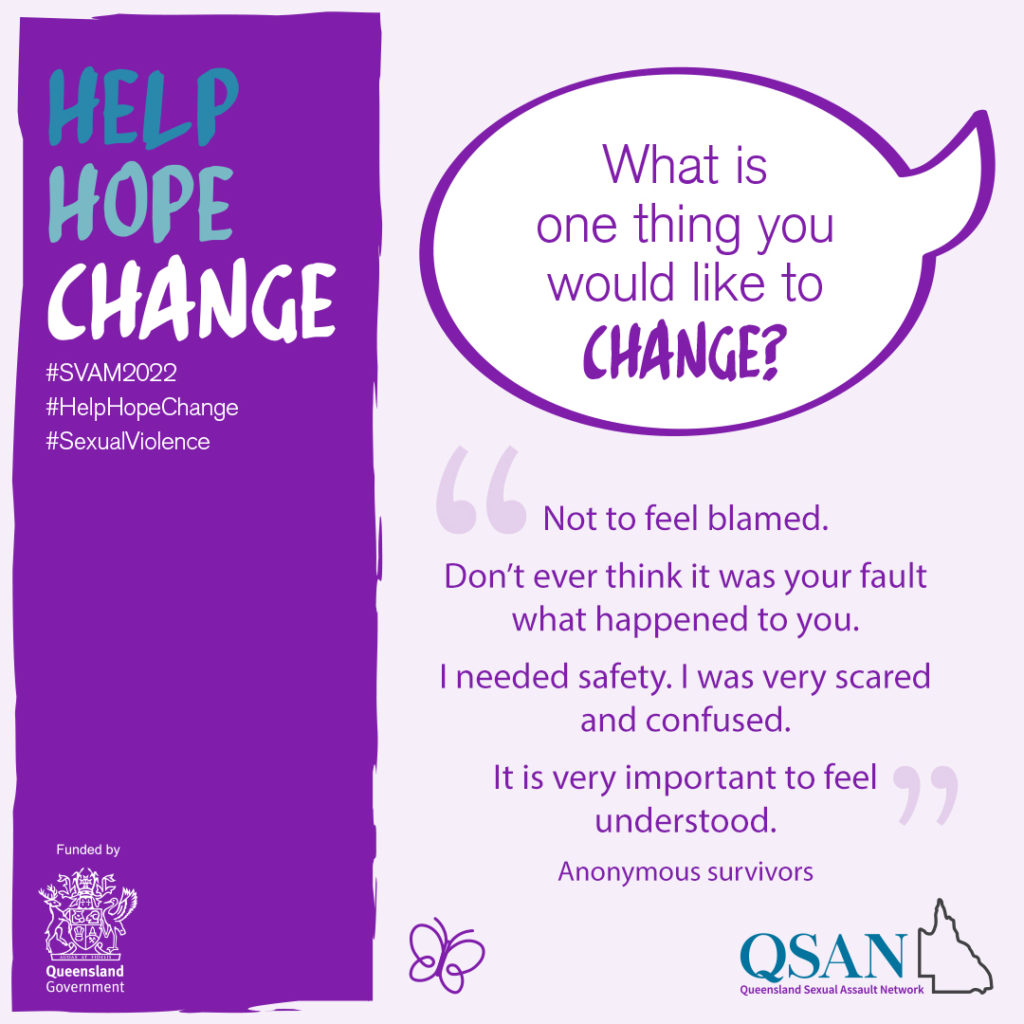
“Not to feel blamed.
“Don’t ever think it was your fault what happened to you.”
Anonymous survivor
“I needed safety. I was very scared and confused.”
“It is very important to feel understood.”
Anonymous survivors
Throughout the responses victim-survivors sought a change to the judgement they endured and had detrimentally impacted up them. Comments such as, “just get over it”, contribute to extreme feelings that can be internalised as shame. Victim-survivor’s stated that they need to be understood, and whilst the physical abuse may have stopped, the psychological impacts continue.
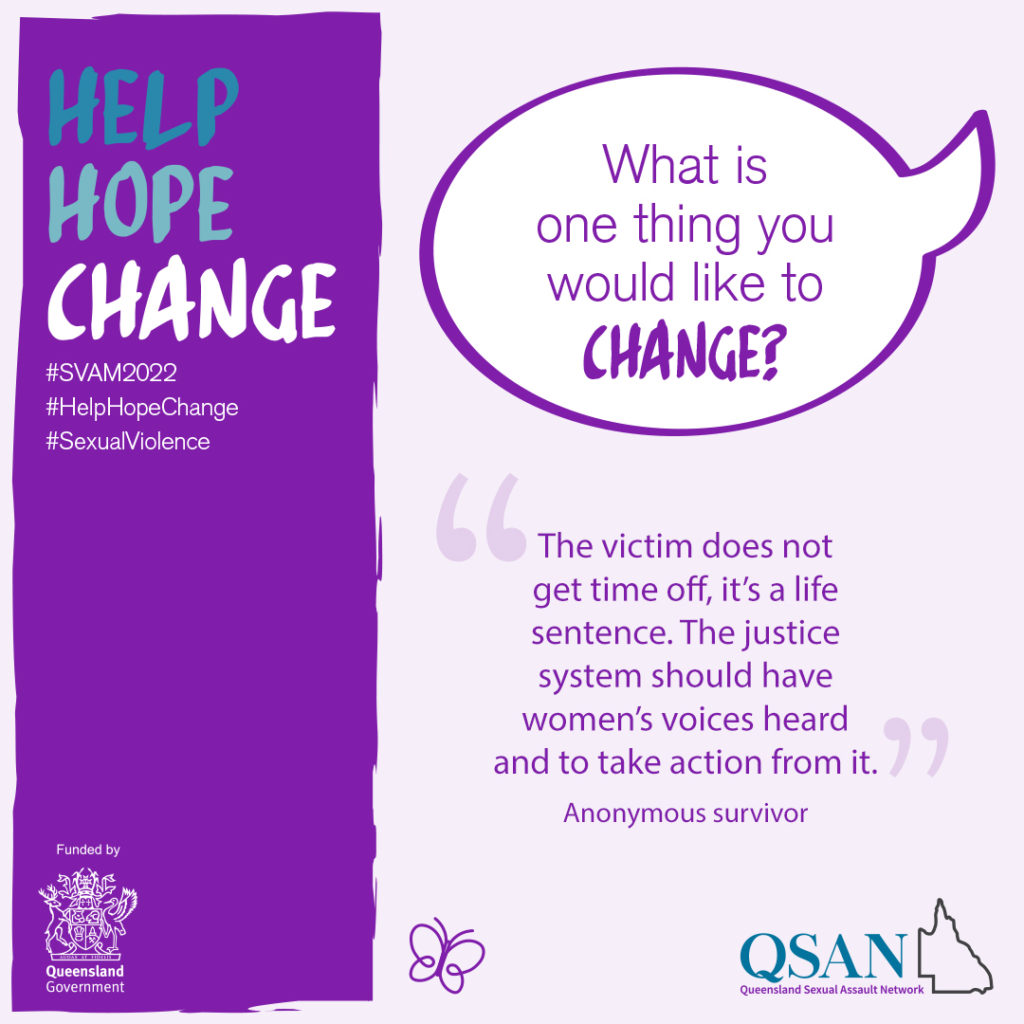
“The victim does not get time off, it’s a life sentence. The justice system should have women’s voices heard and to take action from it.”
Anonymous survivor
“We need a national justice system not state.”
“The court process. It’s drawn out and you don’t often know what’s happening or get regular updates which makes things so much harder.“
“Reporting process is horrible, first few days are hell, you already feel so isolated and alienated – it’s hard to be alone. Outreach or in home support should be available to survivors.”
Anne, Queensland
“Attitude of police officers, from the very first contact with victims of sexual violence.
Specialist training for police.
Police being rude and dismissive; needs to change.”
Anonymous victim-survivors
Throughout responses, the voices of women consistently spoke about the need for systemic change, review, and reform of the justice system, including it being timelier and more responsive. Many responses about the need for changed police responses including a lack of trauma informed responses and a failure to communicate with victim-survivors were consistent themes. Victim-survivors believed the accountability for the perpetrator, was important and for some it assisted with their healing process.
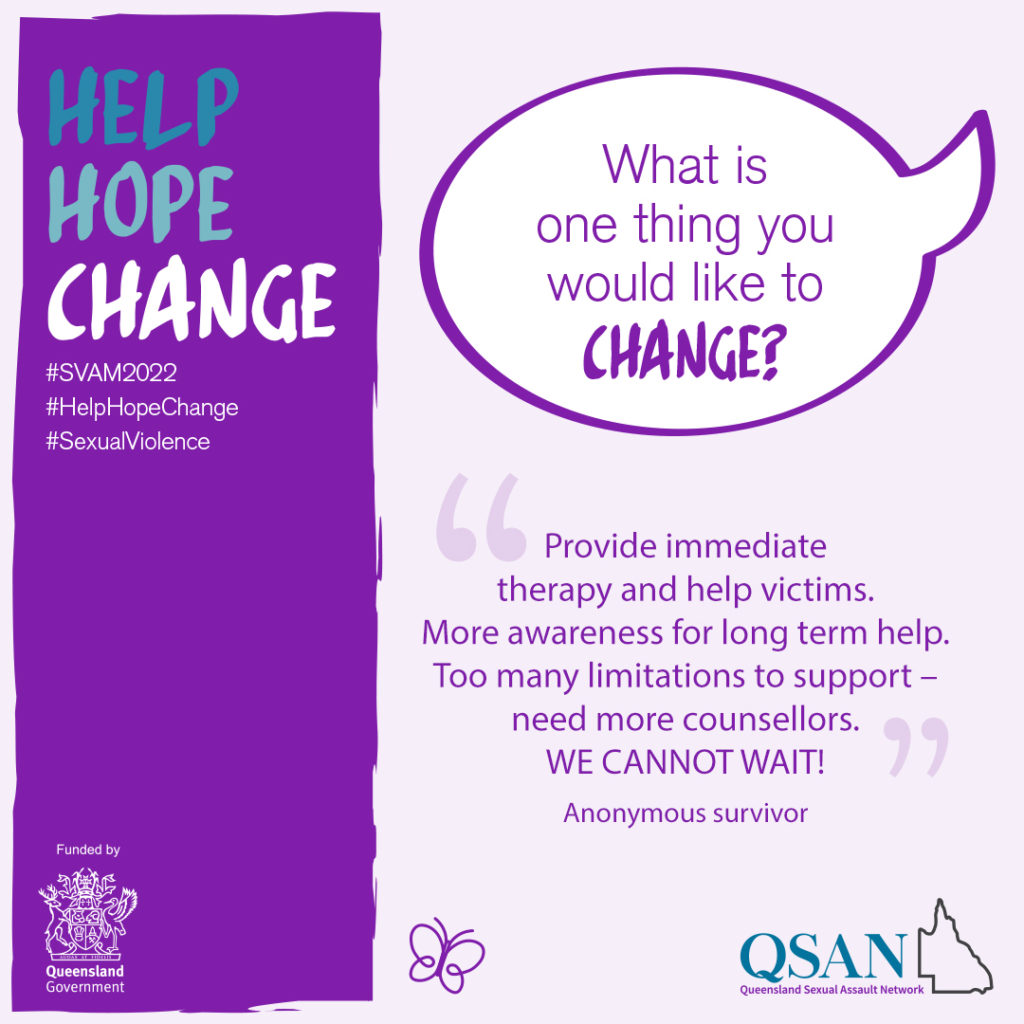
“Provide immediate therapy and help victims. More awareness for long term help. Too many limitations to support – need more counsellors. WE CANNOT WAIT!”
Anonymous survivor
“The 3 Rs: rural, remote and regional support has always been a rather secondary after thought.”
Wahine Toa
A common change theme that emerged was the impassioned plea for more trauma informed services to truly reflect the healing journey of victims-survivors and to ensure specialist services in rural and regional Queensland. Some victim-survivors recognised the importance of financial assistance to support their process of healing.
If you wish to talk to someone about issues of sexual violence, please contact the national sexual violence helpline 1800 Respect 1800 737 732 (24/7) or contact a QSAN service at https://qsan.org.au/services/
QSAN thanks all victim-survivors who generously shared their wisdom and expertise in this campaign and the Queensland Government for their support.
